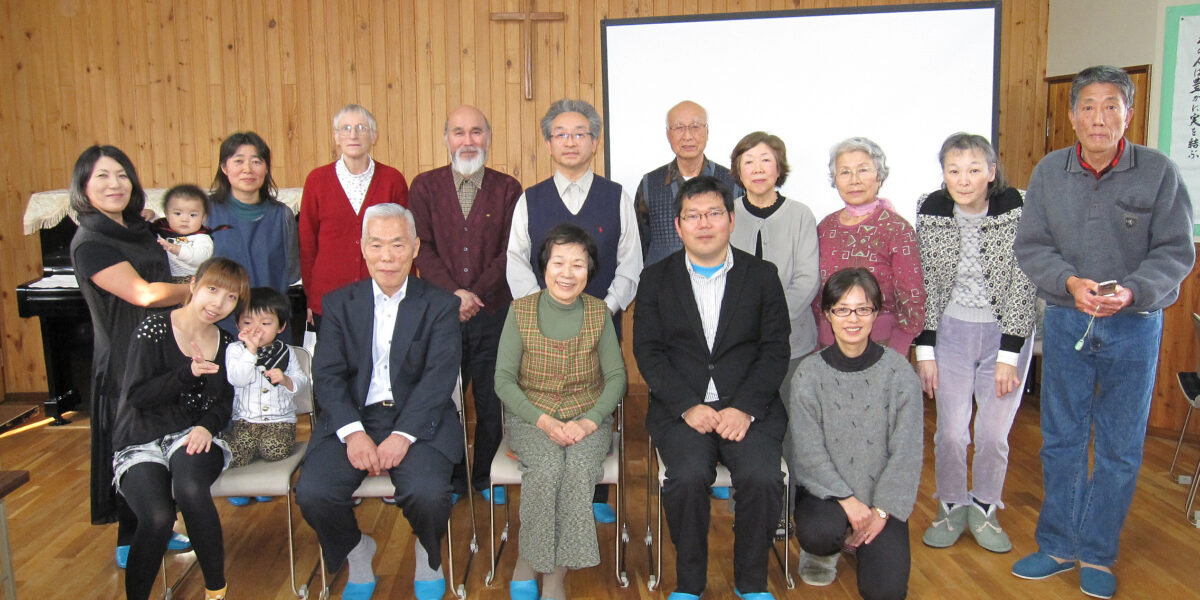A conference of Japanese Mennonites recently adopted a formal document defining what they believe collectively despite their autonomy and differences.
Japan Mennonite Christian Church Conference (Hokkaido) adopted a confession of faith during its 61st gathering on May 18. The conference is comprised of 17 churches. The document reads: “Each congregation is autonomous, independent and self-supporting, but as disciples of Jesus Christ we hereby establish the Japan Mennonite Christian Church Conference Confession of Faith to reaffirm our shared faith today with the hope of further deepening our mutual fellowship and cooperation.”
The core principles, as translated by Ken Shenk, who spent many years among Mennonites in Japan with Mennonite Board of Missions, a Mennonite Mission Network predecessor agency, are:
-
Jesus Christ is the Word of God the Father, and is revealed by the Holy Spirit.
-
The church is a community of believers, which learns from the Bible under the guidance of the Holy Spirit.
-
Believers listen to the Lord Jesus Christ, serve each other, and love their neighbors.
-
Believers care for creation; build peace and justice, which come from Christ; and participate in the work of the kingdom of God.
-
Following Jesus’ nonviolent way of life, we as believers do not participate in war.
“Above all, these five articles make it clear that we live by the same faith as our church’s ancestors in faith, the Anabaptists/Mennonites, who put the Lord Jesus at the center of their faith and sought to listen to and follow Christ in their lives,” wrote Akira Mimoto, pastor of Tottori Mennonite Church, Kushiro, in a document translated to English. “I think that it is highly significant that our conference’s 17 congregations, despite their distinctive autonomous and independent organizational styles, passed as a group of Mennonites this resolution to value and share in these articles of faith that were valued by our forebears in faith.”
The effort to write and adopt the confession of faith began about 10 years ago, said Mary Beyler, a Mennonite Mission Network worker who serves with Mennonite congregations in Hokkaido. The churches have been referencing historical confessions of faith and the confessions of Mennonite Church USA and Mennonite World Conference, but eventually determined that a confession reflecting their unique Japanese and Anabaptist perspective was also needed. Beyler was part of the committee that was appointed to write the confession of faith.
“Some churches wanted to be able to introduce what is unique and special about Mennonites when other Christians or not-yet-Christians come to our churches,” Beyler said. “The confession is short enough to use often in worship, to recite, and to confess together. It can help us to think about and to re-think the foundations of our faith. I hope that it is recited regularly, studied, and preached.”
The confession is also significant as the Japanese discuss possible changes to the nation’s 1947 Constitution to restore its military’s ability to take offensive action outside of Japan’s borders. However, the confession is not a reaction to this. The Hokkaido conference churches have long established that their anti-war stance is because of their faith in Jesus. Japan’s military does play a support role in other nations, such as backing U.S. troops in Afghanistan.
In surrendering to the United States to end World War II, Japan agreed to no longer initiate war. Its current Self Defense Force was established in 1954 for only narrow military support operations. However, some politicians and Japanese citizens would like for this to be lifted, citing fear of aggression from neighboring countries, such as China.
“Having non-participation in war as part of their confession of faith will serve to remind current and future Mennonites in Hokkaido that their aversion to war-making is not just a product of the pacifist impulse that was strong in Japan after World War II,” Shenk said. “It is rooted in their faith in God and the life and teaching of Jesus Christ.”
###
For immediate release
Mennonite Mission Network, the mission agency of Mennonite Church USA, leads, mobilizes and equips the church to participate in holistic witness to Jesus Christ in a broken world. Media may contact news@mennonitemission.net.







